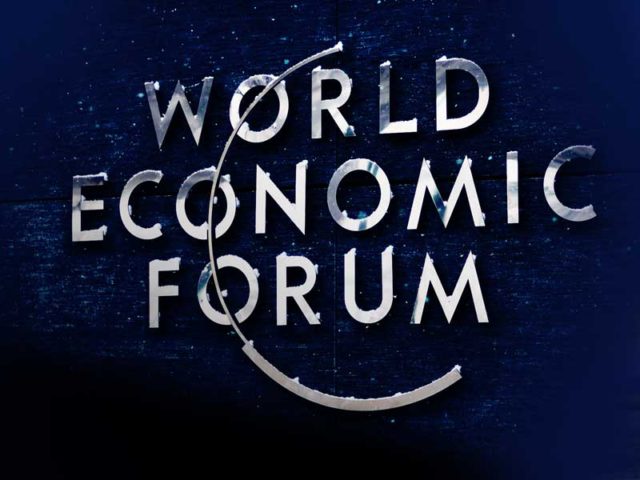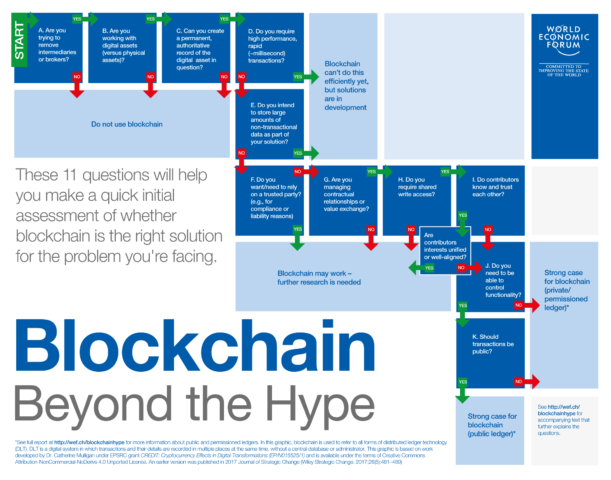- Blockchain hype is damaging to the overall development work required to reap the benefits of this new technology
- Companies need to answer, at most, 11 questions to see if blockchain is the right solution for their problems, according to research and analysis of blockchain’s use in a variety of projects worldwide
- The first condensed question-and-answer visual toolkit on blockchain technology was jointly created by the World Economic Forum Center for the Fourth Industrial Revolution and the Forum’s Global Future Council on Blockchain
For more information on Blockchain Beyond the Hype, A Practical Framework for Business Leaders, click here

San Francisco, California, 23 April 2018 – Blockchain has been hailed as the solution for everything, from resolving global financial inequality, providing IDs for refugees, to enabling people to sell their houses without an estate agent. However, the overwhelming hype surrounding this technology over the past year is misleading and untrue.
“We have been up and down on the blockchain roller coaster this past year,” said Sheila Warren, head of the Blockchain and Distributed Ledger Technology project at the World Economic Forum Center for the Fourth Industrial Revolution. “Blockchain is an innovative solution, but it is not the solution to all problems. Blockchain has to be the right solution for the right business problem. Busting the blockchain hype is necessary to make sure businesses are using it in the right way and not damaging the long-term prospects of the technology.”
Through research and analysis of the technology’s capabilities and the ways it is used around the world, the team found there were 11 questions (at most) to answer to determine if blockchain can be the solution.
“To bust some of the blockchain hype, we had to design a practical framework for people who knew nothing about the technology. We started with the premise that blockchain is like any other technology – a tool in a company’s toolbox,” said Cathy Mulligan, Visiting Researcher at Imperial College London and member of the Forum’s Global Future Council on Blockchain. “If you break down the kinds of problems blockchain technology is solving and its potential, clear paths emerge.”
The paths were incorporated into a framework of “yes” and “no” questions, which guide a business leader once a specific problem is articulated. “This framework cuts through the noise about blockchain and refocuses the technology into the way business leaders think,” said Jennifer Zhu Scott, Founding Partner of Radian and member of the Global Futures Council on Blockchain.
“These 11 questions were developed and then trialled with chief executive officers at a workshop at the World Economic Forum Annual Meeting 2018. The test group included C-suite executives from large corporations, most of whom said they were actively considering adopting blockchain technology in some manner,” said JP Rangaswami, Chief Data Officer, Deutsche Bank.
During the workshop, one publicly listed energy company discussed its plans for an initial coin offering (ICO) and a large bank shared how it was considering using blockchain-based crypto-tokens for transferring remittances. Even in the much-debated cryptocurrency space, 100% of the participants believed that even after the cryptocurrency bubble burst, the token economy would be here to stay.

About the Center for the Fourth Industrial Revolution
Based in San Francisco, the World Economic Forum Center for the Fourth Industrial Revolution brings together governments, leading companies, civil society and experts from around the world to co-design and pilot innovative approaches to the policy and governance of new technologies. The Center will develop, implement and scale agile and human-centred pilot projects that can be adopted by policy-makers, legislators and regulators worldwide to address challenges related to emerging technologies
The World Economic Forum, committed to improving the state of the world, is the International Organization for Public-Private Cooperation. The Forum engages the foremost political, business and other leaders of society to shape global, regional and industry agendas. (www.weforum.org).
